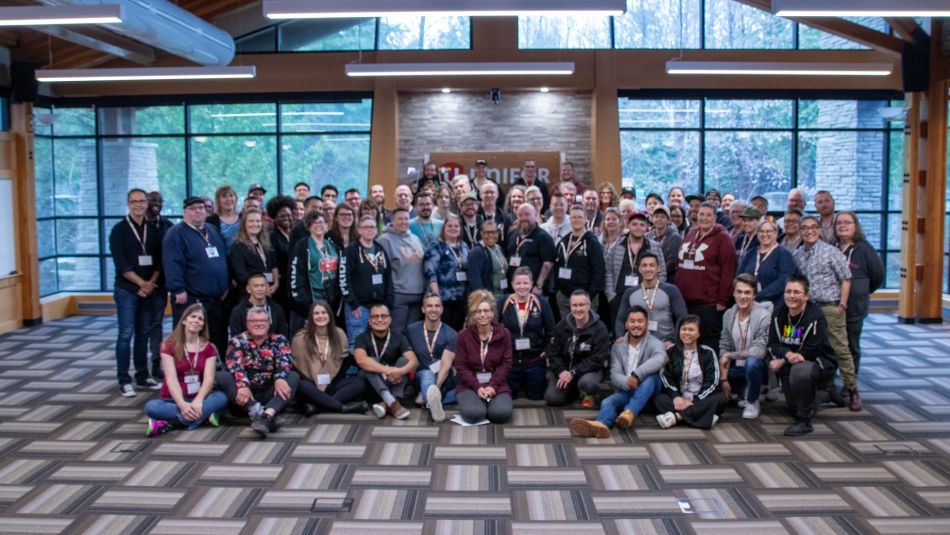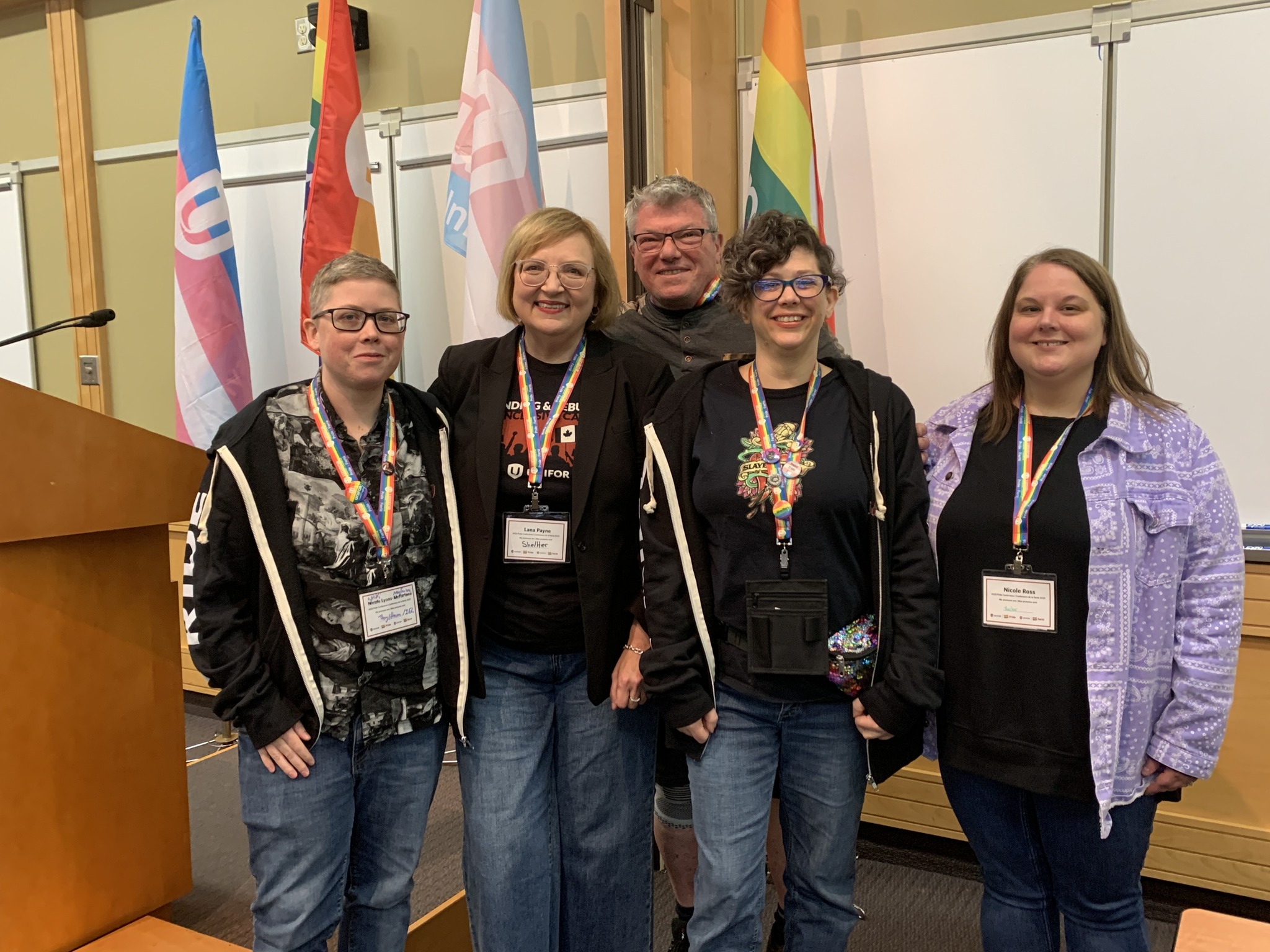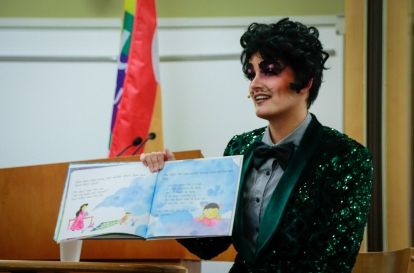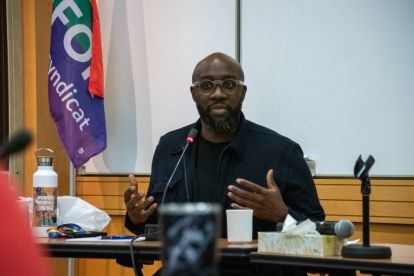
Share
Unifor members battled with a steep and destabilizing increase in attacks on drag artists and the 2SLGBTQIA+ community while building connections at the National Pride Conference, held April 28-30 in Port Elgin, Ont.
The Pride Conference celebrated the diversity of the union and reaffirmed the collective commitment to fight for 2SLGBTQIA+ rights in the workplace and beyond. Delegates attended informative workshops, shared their lived experiences, and stood in solidarity with drag artists facing increasing attacks by hosting a drag king story time and drag show.
“Attacks on drag are a pseudo and proxy for attacks on trans people,” said Cyril Cinder, an Ottawa-based drag king to the crowd.
Within minutes of photos from the event going live on Instagram Friday evening, multiple homophobic and transphobic comments appeared on Unifor’s Instagram page that contained hateful, and misleading information.
The comments exactly mirrored the experiences Cinder vulnerably shared with delegates – lies about drag performers delivering sexual content to youth, acting as predators, and other disinformation by those who fundraise millions based on their attacks on queer and trans people.
“We read the same news and hear of the same workplace struggles and discrimination. Many of your workplaces and communities are not safe,” Unifor National President Lana Payne told delegates. “If our union wants to build safer spaces, then this conference is where we begin.”
Payne said members need help enforcing anti-discrimination laws and policies the communities fought to win already.
“We are a union for everyone and with everyone,” she said. “We must make this mean something when it comes down to employment equity, workplace safety and safe union spaces. Everywhere we look, transphobia and homophobia are rearing their heads and our response must be to out organize them so love wins. “
Cinder, whose father was a past local president for the Canadian Auto Workers (CAW) and Unifor at the Fairmont Château Laurier, said during the conference that attacks on drag are sometimes based on confusion over what actually happens at drag story time.
He shared strategies to counter-protest, such as creating visual and auditory barriers – for example, using copyrighted Disney music, so any protesters’ videos would be quickly taken down from platforms like YouTube. He also suggested using placards to create a wall between protesters and the entrance to the building, so it would shield children and families from seeing the angry mob.
“Just a few decades ago, this performance was illegal. And there are many people in Canada that want it to be illegal,” he said. “We’re here whether you want to see us or not. Why do you want to go into schools and read books in drag? It’s literacy and it’s anti-bullying.”
Saturday’s panel focused on the theme, “Winning the Fight.”
Fae Johnstone – the Executive Director of Wisdom2Action and a trans activist – told fellow panelists Paul Taylor, a CAW intern 20 years ago and now the co-CEO of Evenings & Weekends Consulting, Jessica McCormick, Newfoundland and Labrador Federation of Labour President and Ky Rees, Unifor Local 2002 member and Unifor Atlantic Regional Council 2SLGBTQIA+ Committee chair that approaching the fight for social justice and equality in singular issues might not be the most prudent way to organize.
Taylor, returned to the Family Education Centre to share lessons from his grandmother and mother, who took what little resources they had to create enough to feed their neighbourhood.
“It was mutual aid far before it was called that, that’s just what they did,” he explained. “This is what community is about and where ideas on politics should come from. It’s about working together so that we can all access joy, rest, dignity, good food and play.”
McCormick said it’s pertinent to understand your own power and that of governments and campaigns.
Johnstone, a trans woman, also made a keynote address later on Saturday, shedding light on the 2SLGBTQIA+ response to Murdered and Missing Indigenous Women and Girls (MMIWG) Report.
In March this year, Johnstone took part, along with five women, in a Hershey’s Canada International Women’s Day campaign, "HER for SHE" chocolate bars, featuring the faces of five women working to build a better future through their passion, activism, and work in their communities..
“Within 24 hours, I had [Conservative media personalities] Tucker Carlson, Matt Walsh, Ben Shapiro and Ben Knowles, all attacking me and Hershey,” she said. “Rebel News and other Canadian platforms still fundraise off of this transphobia.”
As this backlash unfolded, “#BoycottHersheys” trended around the world, recalled Johnstone. Hershey’s provided security guards to follow Johnstone around for several days.
“When you have a target painted on your back, then it doesn’t go away,” she said. “We still live in a world where I’ve been harassed on every street downtown. It’s not that every day that someone’s hating on you, but every day, you know there’s the potential.”
Johnstone said society is villainizing trans women. In the past 10 years, she has never been as worried as she is now about where the trans community will be in five years.
“Straight people look at marriage equality and think we’re doing so well, but when I look at my community, we are not doing okay,” she said.
“We’re seeing attacks on inclusion in our schools. Where are our ministers of education? Governments don’t see the microaggressions in our workplaces.”
She added that government and unions have their roles addressing homophobia and transphobia.
“If this government were to support queer and trans organizations and address homophobia and transphobia, then fewer gay kids would be kicked out of school,” she said. “If we had unions behind pushing for gender affirming healthcare in every province, then it would happen faster than it is right now. Don’t let trans folks be alone.”
Conference attendees also participated in a gender diversity workshop.
Run by consultants Kaleb Robertson and Kain Nathaniel, Robertson – a drag king who goes by “Fluffy Soufflé” said the goal of this exercise was not trying to change anyone, but to show that trans and non-binary kids exist.
“We want them to grow into trans adults and survive,” he said. “I am who I am because of these life experiences.”
As a host of The Fabulous Show with Fay and Fluffy, Robertson was nominated for multiple Canadian Screen Awards, winning the Shaw Rocket Fund Kids' Choice Award in April for their work as a drag performance artist.
“It was the first time I had any sense of appreciation for who I was. It was the first time that I had people celebrating me,” said Robertson.
Likewise, Nathaniel said they didn’t have community for two decades of their life.
“Trans just means: You decided that I was one thing at birth, but when I got agency I said, ‘No, you got it wrong,’" they said.
“It’s just all about representation – and giving people the opportunity to tell their stories. We don’t want to be trauma based. My life has had so much joy and transphobia.”
Delegates worked together to develop recommendations for the union to improve conditions for queer and trans members in the workplace, including removal of gender terms in collective agreements, elimination of gender-based work uniforms, and access to gender-neutral washroom facilities, in addition to calls for action to achieve political and social change.
Following three days of informed discussion, participants departed having developed both strategies and strong personal bonds as they returned to their locals and communities to continue to lead in the fight for equal rights.








